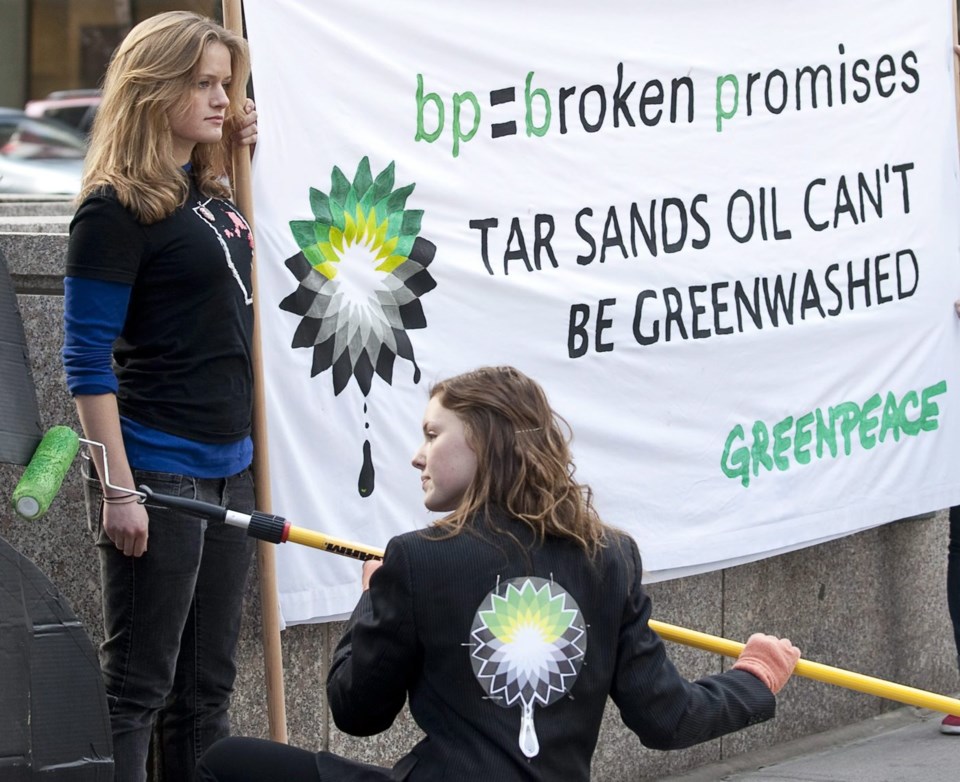The oil and gas industry is taking a risk in its response to new greenwashing rules, communications experts say, but they add the opinions of Canadians are already so divided that the actions may have little effect.
The Pathways Alliance group of oilsands companies removed all content from its platforms, while other companies have modified their websites and social media in anticipation of new greenwashing rules that were passed Thursday as part of an update to the Competition Act.
The chief executives of the six oilsands companies behind Pathways put out a statement late Thursday that said the law, which requires companies to back up their environmental claims with evidence, represents a serious threat to freedom of communications.
The industry chose a very risky response, said Sarbjit Kaur, co-founder of KPW Communications, by email.
"It could be perceived that either their environmental claims are false and unfounded and they've been misleading the public all along — or they don't respect legislation that is designed to ensure Canadians are getting accurate and truthful information."
She said that in an era of misinformation, it's more important than ever that claims be backed up.
"Any reluctance to do so reflects badly on an industry or organization."
The executives behind Pathways said the public disclosure standards in the bill are so vague that they lack meaning and rely on undefined internationally recognized methodology that "may or may not exist."
They said the law opens the door to frivolous litigation, as it allows outside groups to launch efforts at enforcement through the courts system.
"The result of this legislation, which has been quickly put in place with little or no consultation, is to silence Canadian businesses taking climate action," the heads of Canadian Natural Resources Ltd., Imperial Oil Ltd., MEG Energy Corp., Cenovus Energy Inc., ConocoPhillips Canada, Suncor Energy Inc. and the Pathways Alliance, said in the statement.
The law amendment, however, follows established patterns of competition rules, said Wren Montgomery, associate professor of sustainability at Western University's Ivey Business School, who studies greenwashing.
"What the Competition Bureau has always done is make sure companies aren't fooling or lying to Canadians."
She said there are numerous internationally recognized methodologies to make sure companies are backing up their claims, like the Science Based Targets initiative that sets out guidelines on what a legitimate net-zero emissions target looks like.
"There's lots of easy ways for companies who are actually legitimately making changes on the environment to report to an acceptable standard to prove that they're doing that," Montgomery said.
She said there's flexibility in the wording of the act to give the Competition Bureau room to adapt as standards evolve, but it was important to have the words 'internationally recognized' to avoid the use of small, often industry-funded standards that may set a low bar.
The update is also important, said Montgomery, because there's been an increase in so-called future washing, or promises of better environmental records ahead, that have so far proved difficult to police.
On the concern of frivolous lawsuits, she said a Competition Tribunal will review cases before they go to the courts to make sure they're legitimate.
She said Canadians, especially younger consumers, are very savvy and dislike hypocrisy, and will look at the industry's move as a confirmation of suspicions.
"I think what they're going to think is, 'Hey, we were right. Not all of these claims were legitimate or were backed in evidence.'"
While the decision by oil and gas companies may serve to confirm skeptics' existing views, it will also reinforce opinions on the pro-industry side, said Joanne McNeish, associate professor of marketing at Toronto Metropolitan University's Ted Rogers School of Business.
"I would imagine that this will have no effect on opinions, since Canadians already have their perception on the oil and gas industry," she said by email.
She said providing support for environmental claims can be much harder when a company is trying to account for supply chains and industry partners. The removal of industry claims signals the uncertainty the companies feel about the implications of the bill, and could lead to reduced communication efforts going forward.
"They have tried to explain the complexity of these issues and are still criticized," she said.
Shane Gunster, a professor at Simon Fraser University's School of Communications, also thought the move will be viewed closely along political lines.
"I suspect in some ways, those on the right will find it to be almost a useful thing that they can say, well, here's another example of freedom of speech, or freedom more broadly being squashed."
But he said that in terms of persuading the general public, which doesn't follow these issues very closely, it's more likely that the audience will see it as confirming suspicions about the industry.
"Scrubbing your website and essentially going dark, really could raise some questions with those people, especially in so far as it fits with a sort of broader social understanding of the role that the oil and gas industry has played historically in cultivating climate denial."
Pathways members emphasized the move doesn't change their environmental commitments, but Gunster said the past record of the global oil and gas industry leaves many skeptical.
"I really do think that people are likely to draw upon what they already think with respect to the role of the oil and gas industry in greenwashing, and the role of the oil and gas industry in climate skepticism or denial," he said.
"It's just, the evidence is so overwhelmingly damning historically of what they have done."
This report by The Canadian Press was first published June 21, 2024.
Ian Bickis, The Canadian Press




